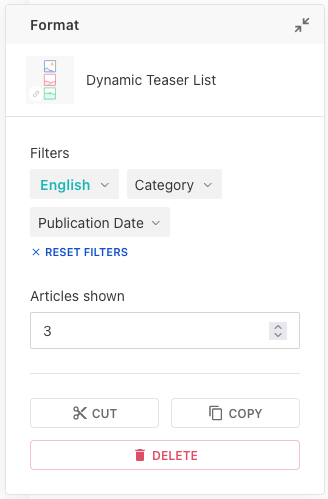Supported Features
| Document | ✗ |
| Media | ✗ |
| Include | ✔ |
| Document Creation Flow | ✗ |
| Push Message | ✗ |
| Table Dashboard | ✗ |
| Display Filter | ✗ |
| Search Indexing | ✗ |
| System Metadata | ✗ |
| Webhook Conditions | ✗ |
Description
The li-document-search plugin simplifies the management and rendering of article teaser lists within pages based on configurable filters. It provides an efficient solution for semi-automatic page management. This approach reduces the need for custom code compared to other solutions within Livingdocs.
Configuration
li-document-search supports filtering articles with base filters and display filters. Base filters are always applied and cannot be modified by editors, whereas display filters are rendered in the interface and adjustable by editors. Additionally, sorting order and a limit can be defined, with the latter also being adjustable by editors.
li-publications. Make sure that your configured filters are supported by this index.To set it up, create an include service containing the li-document-search plugin:
{
name: 'dynamic-teaser-list',
paramsSchema: [{
handle: 'teasers',
type: 'li-document-search',
config: {
baseFilters: [{key: 'metadata.showOnHomepage', term: true}],
displayFilters: [
'language',
{metadataPropertyName: 'category'},
{filterName: 'liDateTimeRange', config: {documentPropertyName: 'lastPublicationDate'}}
],
showLimit: true,
defaultLimit: 3,
minLimit: 2,
maxLimit: 6
}
}],
rendering: {
type: 'function',
render (params, context) {
const content = params.teasers?.values
.map((document) => ({
component: 'teaser',
content: {
title: document.metadata.title
}
}))
return {content}
}
}
}
Term Variables
In addition to the regular Search DSL, base filters in li-document-search support term variables. Term variables enable you to reference a value that is evaluated only at the time of the request.
To learn more, please refer to the term variable documentation.
User Interface
Editors can adjust display filters in the user interface to control which articles should be included. If enabled, they can also adjust the number of included articles.

filter, sort and context attributes. All other attributes are not persisted. For more details, refer to our guide on how to write custom display filters.Resolving
The specified filters are stored within documents and evaluated on request. Therefore, teaser lists may contain other teasers over time as new articles match the filters, without requiring editors to republish a page. Thus, it is recommended to configure your delivery to repeatedly invalidate the cache for such pages and refetch them occasionally from the Composition API to obtain the latest state.
We recommend obtaining documents from the Composition API, as it supports resolving includes. For li-document-search, Livingdocs automatically preloads all matching documents, no matter whether preload is set or not, and passes them to your render function. The documents are deduplicated across all components in a page, ensuring each teaser is displayed at most once.
Storage Format
{
baseFilters: <Array<QueryDSL>>,
displayFilterStates: <Array<{filter: QueryDSL, context: object, sort: SortParam}>>,
sort: <String>,
limit: <Integer>
}
Include Config
{
name: 'myInclude',
paramsSchema: [
{
handle: 'myHandle',
type: 'li-document-search',
config: {
contentTypes: [], // optional, shorthand for contentType base filter
baseFilters: [], // optional
displayFilters: [], // optional
sort: '', // optional
showLimit: true, // optional, show limit input in UI
defaultLimit: 3, // required, default number of included documents
minLimit: 1, // optional if showLimit=true, minimum configurable limit in UI
maxLimit: 5 // required if showLimit=true, maximum configurable limit in UI
}
}
]
}